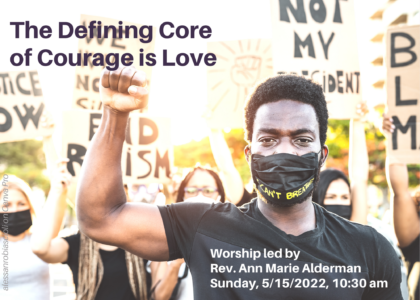Please visit our YouTube channel to watch Rev. Ann Marie’s video recording of this reflection.
The word courage comes from the Latin cor, which means heart. According to poet Mark Nepo, the original use of the word courage meant to stand by one’s core: a “striking concept that reinforces the belief found in almost all traditions … living from the Center is what enables us to face whatever life has to offer.”
“To ‘encourage’ means to hearten; to impart strength and confidence. This is our work, as a religious community: to encourage one another; to be bold in engaging the world around us, as well as what scares us internally; to give one another the confidence and heart to live as fully as possible.” These words are from Erika Hewitt, the UUA’s Minister of Worship Arts.
Rebecca Parker, once the dean of Starr King School for the Ministry, came to a UU district convention back when we had districts (which some time ago merged into what we have now, regions). I was there when Parker came to a district convention as the featured speaker. When it was time for her to deliver her talk, I was completed captivated by her and what she had to say. She had not only my attention, but my complete agreement throughout… until she came to the very end. Her conclusion was about the God who will not let us go, no matter what.
Perhaps if she had said “the LOVE that will not let us go,” I could have stayed with her in solidarity of thought and experience. But when she talked about the God who will not let us go, something rose up in me. I felt the need to protest, to say it wasn’t so. I was agitated and wanted to raise my left fist in the air. I didn’t do that, but I did rush up to her afterwards and let her know that she had not captured my reality.
I had long felt that I had been “let go” by the church community to which I had belonged as a child and as a young person. I had felt let go by the church community that I had chosen to be a part of as a young adult while studying to be in the ministry. I left all of these so called spiritual “homes” feeling like it wasn’t just the people there, but the God who the people believed in who had “let me go.” So, used to thinking of myself as rejected by God, left on the outside of the community of the beloved, on the margins, I had learned to be comfortable in my varying band of misfits. That sense of self, years in the making, and well developed by the time of that district convention, had me thinking as a UU that I was in a particular band of misfits and heretics who had no use for the holy.
Yet there was the dean of one of the two UU theological schools, declaring something I found hard to hear. How could the God who had let me go, let me down, who had found me unacceptable, be the same as the one she was speaking of?
When I first entered a circle of UUs, they asked who I was. When I told them I was educated to be a minister, but was also gay, they said, “So what? You are fine with us. We want you here.”
I want you to feel that freeing sense of the UU acceptance as a “so what.” I want you to feel so completely accepted, so loved for who you are, who you have been, and you may become, that when you are angry enough to say what you think is the very worst thing about you, the response is “So what?”
I want you to feel encouraged to do what you were born to do, what you have, or are becoming enlightened for. I want you to live from your center, your truth. Especially when your truth isn’t my truth. When our truth is different, I want us all to see that the truth is fluid, that revelation continues, that change is real.
It takes a certain boldness to be a UU, to stand in who you are unafraid, to move more fully into the love that won’t let you go.
This faith is so much more than a social club for misfits, for heretics, for outsiders. It is a way to move through this world with courage, centered in a web of heart, connected to what lies beyond wounds, violence, repeated trauma. To hope beyond hope, to act as if love will always be present.
The defining core of courage is love. Without love, courage is not possible. Acts of bravado, yes—but true courage is the natural outgrowth of our love of all that we hold dear, of the preciousness of each human life, and a deep belief that what we love matters. Without love, there is nothing at stake, nothing to fight for.
Barbara Bonner
If you appreciated this reflection, please text to give or visit our Give Now page to support the UUCSH Share the Plate efforts to assist those in need.

